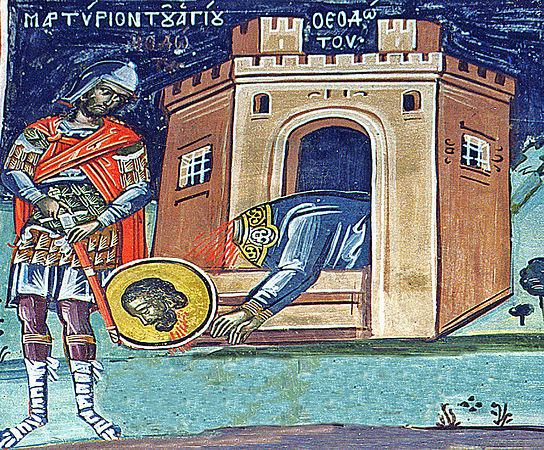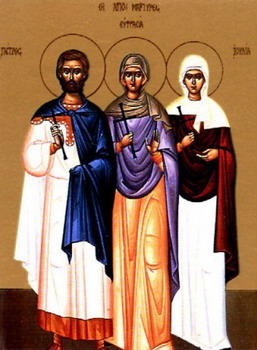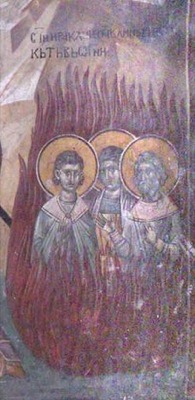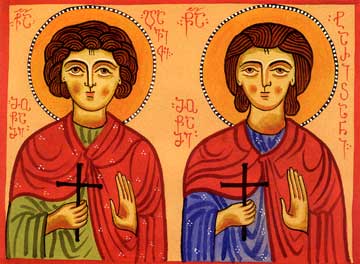|
|
The Holy Martyr Theodotus, and the seven maiden martyrs: Tecusa,
Alexandra, Claudia, Favina, Euphrasia, Matrona and Julia Theodotus was a married man and an innkeeper in Ancyra in the time of the Emperor Diocletian. Although he was married, he lived according to the words of the Apostle: 'Let them who have wives be as though they had not' (I Cor. 7:29). But he kept the inn on, in order to be able unsuspectedly to help Christians, and his inn was a refuge for persecuted Christians. Theodotus secretly sent help to the Christian refugees in the mountains, and secretly gathered the bodies of those who had been killed, giving them burial. At that time, seven maidens were taken for trial and tortured for Christ. They were tortured, mocked and then thrown into a lake. One of them, St Tecusa, appeared to St Theodotus and told him to take her body out of the lake and bury it. Under cover of night, Theodotus set off with a companion to carry out the martyr's wishes, and, led by an angel of God, succeeded in finding all seven bodies and burying them. But this friend betrayed him to the authorities and the judge put him to harsh torture. Theodotus endured all the tortures as though not in his own body, having his whole mind steeped in God. When the torturers had made his body one great wound and broken his teeth with stones, it was ordered that he be beheaded. When he was taken to the scaffold, many Christians wept for him, but St Theodotus said to them: 'Don't weep for me, my brethren, but glorify our Lord Jesus Christ, by whose aid I am finishing my course and overcoming the enemy.' Saying this, he laid his head on the block under the sword and was beheaded, in the year 303. A priest buried the martyr's body on a hill outside the city and a church dedicated to St Theodotus was later built on the site. Theodotus was a married man and an innkeeper in Ancyra in the time of the Emperor Diocletian. Although he was married, he lived according to the words of the Apostle: 'Let them who have wives be as though they had not' (I Cor. 7:29). But he kept the inn on, in order to be able unsuspectedly to help Christians, and his inn was a refuge for persecuted Christians. Theodotus secretly sent help to the Christian refugees in the mountains, and secretly gathered the bodies of those who had been killed, giving them burial. At that time, seven maidens were taken for trial and tortured for Christ. They were tortured, mocked and then thrown into a lake. One of them, St Tecusa, appeared to St Theodotus and told him to take her body out of the lake and bury it. Under cover of night, Theodotus set off with a companion to carry out the martyr's wishes, and, led by an angel of God, succeeded in finding all seven bodies and burying them. But this friend betrayed him to the authorities and the judge put him to harsh torture. Theodotus endured all the tortures as though not in his own body, having his whole mind steeped in God. When the torturers had made his body one great wound and broken his teeth with stones, it was ordered that he be beheaded. When he was taken to the scaffold, many Christians wept for him, but St Theodotus said to them: 'Don't weep for me, my brethren, but glorify our Lord Jesus Christ, by whose aid I am finishing my course and overcoming the enemy.' Saying this, he laid his head on the block under the sword and was beheaded, in the year 303. A priest buried the martyr's body on a hill outside the city and a church dedicated to St Theodotus was later built on the site.The Holy Martyrs Peter, Dionysius, Andrew, Paul and Peter - a young and gifted man; Dionysius -a nobleman; Andrew and Paul - soldiers; and Christina - a sixteen-year-old girl; they all courageously confessed Christ the Lord and underwent torture and death for His name in the year 250. One Nicomachus, who was tortured with them denied Christ under torture, and instantly lost his mind, tearing at his body with his teeth and foaming at the mouth until he breathed his last. Peter - a young and gifted man; Dionysius -a nobleman; Andrew and Paul - soldiers; and Christina - a sixteen-year-old girl; they all courageously confessed Christ the Lord and underwent torture and death for His name in the year 250. One Nicomachus, who was tortured with them denied Christ under torture, and instantly lost his mind, tearing at his body with his teeth and foaming at the mouth until he breathed his last.The Holy Martyrs Heraclius, Paulinus and Benedimus They were Athenians, and suffered for the Faith in the time of Decius. They were thrown into a burning furnace for the name of Christ. They were Athenians, and suffered for the Faith in the time of Decius. They were thrown into a burning furnace for the name of Christ.Martyrs Symeon, Isaac, and Bachtisius of Persia (339)The Holy Martyrs Simeon, Isaac and Bakhtis were Christians and lived during the III Century in Persia under the emperor Sapor, a fierce persecutor of Christians. They tried to force the saints to recant from Christ and be converted to the grim faith of fire-worship. But they refused and answered the pagans: "We will not recant from the Creator of all and we will not worship fire nor the sun". They cruelly tortured the holy martyrs, then threw them into prison, where they were not given food for seven days. Finally, they beheaded the martyrs.
Saint Stephen the New, patriarch of Constantinople
Martyr Julian
Martyr Euphrasia of NicaeaThe Holy Martyress Euphrasia was a native of the city of Nicea. She accepted death for Christ at the time of the emperors Diocletian and Maximian – at the end of the III or beginning IV Century. Subjected to many tortures, the martyress was drowned in the sea.
Hieromartyr Theodore, pope of Rome
Saint Anastaso of Lukada
Venerable Martinian of Areovinthus, monk
Holy Martyrs Davit and Tarichan (693) The holy martyrs Davit and Tarichan were born to Vardan and Tagine, pious Christians and relatives of the king. Vardan died while his sons were still young, and Tagine’s pagan brother Theodosius seized all the family’s possessions.
Concerned that the brothers would eventually claim their legal inheritance, Theodosius resolved to convert his sister and nephews to his own creed. “Leave behind the Faith of the crucified Christ and receive mine and I will adopt your children,” he told Tagine. But Tagine firmly guarded the family against her brother’s evil intent. “It is enough that you have seized my sons’ estate,” she said. “But you cannot seize the inheritance they will receive from their Father in heaven!”... The holy martyrs Davit and Tarichan were born to Vardan and Tagine, pious Christians and relatives of the king. Vardan died while his sons were still young, and Tagine’s pagan brother Theodosius seized all the family’s possessions.
Concerned that the brothers would eventually claim their legal inheritance, Theodosius resolved to convert his sister and nephews to his own creed. “Leave behind the Faith of the crucified Christ and receive mine and I will adopt your children,” he told Tagine. But Tagine firmly guarded the family against her brother’s evil intent. “It is enough that you have seized my sons’ estate,” she said. “But you cannot seize the inheritance they will receive from their Father in heaven!”... |